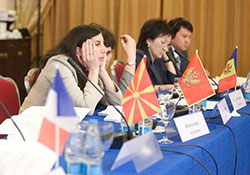Policies and resolutions

WHO
WHO supports the country, intercountry and regional efforts of its Member States in developing, implementing and monitoring the effectiveness of national medicines policies, guidelines, strategies and plans that ensure the availability, affordability and responsible use of essential medicines that are safe, effective and of good quality.
One of the priorities for many countries is to expand access to essential, quality medicines and ensure universal health coverage. Many of WHO/Europe's activities focus on financing, pricing and reimbursement, procurement and supply systems and quality assurance.
Effective networking with countries and partnerships with other international organizations, aid agencies and nongovernmental organizations are crucial to the achievement of sound, sustainable results.
Some key principles are followed in national policy development.
- Policies, processes, and decisions should be transparent.
- Policies should have appropriate legislative frameworks, governance and administrative structures.
- The regulation of pharmaceutical policies necessitates effective implementation to ensure compliance.
- Policies promoting the use of quality-assured generic medicines should be adopted to increase budgets for new medicines.
- Countries should collaborate in promoting information exchange on policy tools.
WHO/Europe also collaborates with WHO headquarters and other WHO regions in the field of health technologies. Since 2008, these efforts have included work on the global initiative on health technologies, which has 2 main objectives:
- to establish a framework for national health technology programmes that ensures effective use of resources (for example, procurement guidelines, management tools, performance indicators); and
- to identify and adapt innovative technologies that are expected to have a significant impact on public health in Member States.



